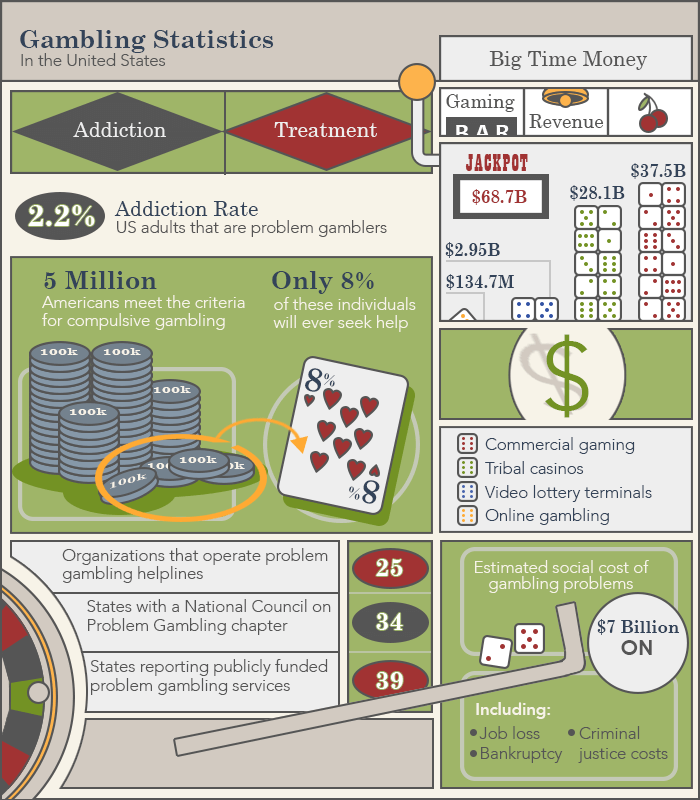Warning Signs Of Compulsive Gambling
Feeling a constant urge to gamble even when you are already in a difficult financial situation, or gambling as a way out of financial difficulty are both common symptoms of a gambling addiction. Treatment for compulsive gambling may involve an outpatient program, inpatient program or a residential treatment program, depending on your needs and resources. Treatment for substance abuse, depression, anxiety or any other mental health disorder may be part of your treatment plan for compulsive gambling. Relapse prevention.
Introduction
An addiction to gambling can be just as devastating to people’s lives as drugs or alcohol. In fact, gambling addiction similar to a drug addiction, and is to be taken just as seriously.Source: https://www.addictions.com/news/9-warning-signs-of-a-gambling-addiction/1. Using gambling to self-medicate or escape
Gambling is fun and exciting to many people who never develop an addiction. Gambling addicts, however, tend to use this excitement to escape personal conflicts or self-medicate mental health disorders such as depression or anxiety. This is one of the gambling addiction symptoms that responds best to professional treatment, because treating the underlying mental health issue with therapy and/or medication can help break the cycle of addiction by removing the biggest motivation for compulsive gambling.2. Neglecting work, school, & home obligations
Just as a drug addict will use compulsively to satisfy cravings for their drug of choice, gambling addicts gamble compulsively to satisfy their own intense cravings. The power of this compulsion frequently lead problem gamblers to neglect responsibilities at work, school or home because so much of their time and energy is funneled into gambling. Addicts will lose track of time while gambling, often due to “chasing losses,” where they obsessively attempt to recover lost money by gambling more and more. Gamblers tell themselves that they’ll quit as soon as they break even, while their debts and lost time only accumulate3. Obsessed with Gambling
 Addicts become preoccupied with gambling to the point of obsession. Most of their time not spent gambling is spent planning when they will be able to gamble next, or how they will get more gambling money. This obsession contributes to neglecting relationships and responsibilities, because it is difficult for the addict to focus on anything unrelated to their gambling addiction.
Addicts become preoccupied with gambling to the point of obsession. Most of their time not spent gambling is spent planning when they will be able to gamble next, or how they will get more gambling money. This obsession contributes to neglecting relationships and responsibilities, because it is difficult for the addict to focus on anything unrelated to their gambling addiction.4. Financial hardships caused by gambling
Once a gambling addiction takes hold, debt will inevitably follow. Although there are rare wins in gambling, “the house always (usually) wins.” Addicts will start asking loved ones for money to bail them out, sell or pawn their belongings, or even resort to fraud, theft and other illegal activities in their desperation to recover their losses. Spending money that is needed for other things, like food, bills, or rent, on gambling could be an early warning sign of a gambling addiction.5. Endangering or losing jobs, relationships ....
Endangering or losing jobs, relationships and opportunities at school or workWarning Signs Of Compulsive Gambling Disorder

Financial hardships may be exacerbated by other gambling addiction symptoms, such as losing jobs or opportunities to advance at school or work. This kind of loss can result from gambling, wheer the obsession gets in the way of an addict follow through on their responsibilitiess or can be a direct result of compulsion, where an addict is caught gambling on the job, or embezzling money to cover gambling debts.
Gambling
6. Denial
Even when the problem is obvious to everyone in the compulsive gambler’s life, many addicts will continue to deny or minimize the problem. They will insist that they have it under control, lying about how often they gamble, how much they bet, and how much money they owe. Denial is one of the gambling addiction symptoms that presents a major obstacle to seeking treatment, because you can’t ask for help until you admit you have a problem.7. Withdrawing from friends and family
Whether out of guilt, a desire to keep the addiction secret, or as a reaction to loved ones who have expressed concern about noticeable gambling addiction symptoms, compulsive gamblers often withdraw from friends and family, avoiding them both emotionally and physically. Secretive behavior and social isolation are more warning signs of gambling addiction that are also signs of drug addiction.8. Continue Gambling Despite Negative Consquences
Continuing to gamble despite the negative consequencesWarning Signs Of Compulsive Gambling Disorders
Despite recognizing many gambling addiction symptoms in themselves, and even after suffering serious consequences due to gambling, such as losing a job, a spouse, a home, or getting in legal trouble, compulsive gamblers will continue gambling. This is partly because gambling is an addiction that feeds on itself. Addicts seek to solve the problems caused by their gambling with more gambling, feeling sure that a big win is just around the corner.
9. Feeling incapable of controlling their behavio
Feeling incapable of controlling their behavior despite wanting toMany compulsive gamblers sincerely want to stop gambling, but find themselves incapable of doing so—at least without professional help. In fact, without treatment, the problem is more likely to escalate over time, as an increasing tolerance to the “high” of gambling, along with mounting financial problems, will push the addict towards larger stakes bets. Gambling addicts who try to quit will often return to gambling because they begin to suffer withdrawal symptoms such as restlessness, anxiety, irritability, insomnia, and depression.
The many labels used to describe gambling problems are a source of confusion for the public and frustration for researchers. Commonly used terms include “problem”, “at risk”, “compulsive”, “disordered”, and “pathological” gambling. These various terms reflect the efforts of researchers to describe the different levels of severity observed among people with gambling problems. Labels such as “problem” gambling are used to describe individuals who are experiencing some adverse consequences as a result of their gambling but do not meet the criteria for a diagnosis of pathological gambling.
“Gambling Disorder” is the term used by the American Psychiatric Association in the 5th edition of the Diagnostic and Statistical Manual of Mental Disorders (DSM) to describe the most severe form of the disorder (American Psychiatric Association, 2013). According to the DSM-5, gambling disorder is indicated by four (or more) of the following:
Warning Signs Of Compulsive Gambling Laws
- Preoccupied with gambling
- Unable to cut back or control
- Irritable or restless when attempting to cut down or stop gambling
- Risks more money to reach desired level of excitement
- Gambles to escape problems or depressed mood
- “Chases' losses
- Lies to family and others about gambling
- Risks or loses relationships or job because of gambling
- Relies on others for financial needs caused by gambling